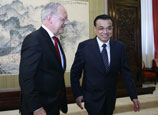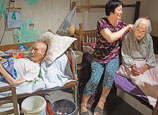
Officials with foreign workers' office say Deng's policy boosted nation
China has gone from being a country with few foreigners to an emerging hub that has drawn global talent in the past three decades through the foresight of late leader Deng Xiaoping, say officials with the department that oversees attracting and managing international professionals.
Deng's talks that set out China's strategy of recruiting overseas talent remain inspiring and instructive even today, said Zhang Jianguo, director of the State Administration of Foreign Experts Affairs.
On July 8, 1983, Deng told four of his colleagues, including then vice-premier Wan Li, that China should invite foreign professionals to participate in its development and modernization because "we lack experience and knowledge".
"We should not scrimp on spending a little more money to invite foreigners. ... Whether (they stay in China) for a long or short time, it is beneficial," Zhang quoted Deng as saying.
"Deng's theory on recruiting foreign talent slipped the leash of 'left thoughts' at the early stage of reform and opening-up and he articulated that all advanced techniques in economic and social development can be utilized by China. It's a great breakthrough."
Zhang said there were few foreigners in China after the turmoil of the "cultural revolution" (1966-76). But there were an estimated 550,000 foreign experts working in China in 2012 and the figure keeps rising at a rate of about 5 percent annually, he said.
Wang Nai, a former director of the administration who started working there in 1983, witnessed top leaders' determination and actions to attract global talent.
About one month after Deng made that speech, the State Council set up a team headed by then vice-premier Yao Yilin and three State Councilors to take charge of recruiting and managing foreign talent, Wang said.
"Without such a high-level administrative body, it would have been impossible to remove all the psychological and regulatory barriers," he said.
"At that time, only a few cities allowed foreigners entry. Beijing was one, but there were signs warning expats not to go farther unless they obtained permits at the boundaries of 20 kilometers from the city center," he said.
"It was inconvenient for foreigners to live or work in China at that time, but Deng's speech brought hope for change," he said. "Now foreigners can go anywhere in this country except for prohibited military zones."
Foreign experts have played an "irreplaceable role" in spurring China's development, Zhang said.
He gave the example of Japanese rice expert Hara Shoichi to prove his point that introducing foreign talent helps Chinese "climb up by standing on the shoulders of giants".
From 1982 through 2002, Shoichi was committed to popularizing a new rice growing technique that raised seedlings in dry fields.
The technique helped increase the average yield by 10 percent. Now, 40 percent of the country's rice fields use this technique.
Zhang said the government will prioritize recruiting skilled foreign professionals who it will need in natural sciences.
"Technology and management skills are key to ensuring China's successful transition of its economic development mode. So we need top professionals to solve critical issues and problems," he said.
"We have noticed that scientists and top professionals are global citizens who tend to go to places with abundant R&D investment, simplified visa policies and good environments," he said. "China now can offer competitive salaries and research funds to attract these people."
His administration launched a program called the Recruitment Program of Foreign Experts in 2011, which aimed to recruit up to 1,000 foreign professionals younger than 65 over 10 years to boost China's capabilities in scientific research, innovation and corporate management.
The upper age limit can be relaxed in some circumstances, for example, if the applicant is a Nobel Prize winner or has mastered a world-leading technique China requires, Zhang said.
To date, 129 foreign experts without Chinese origin have been recruited through the program. Every foreign professional recruited by the program receives a relocation subsidy of 1 million yuan ($163,000), plus a research fund of 3 million to 5 million yuan.
China is also providing better policies and working conditions for foreign professionals in accordance with international practices, such as introducing more convenient visa and residence policies, he said.
The Law on the Exit and Entry Administration, which took effect on July 1, introduced a talent visa, which has simplified the requirements for foreign professionals to get residency rights and allows multiple entries and exits over five years.
"Introducing the talent visa to attract international experts will be extremely important, benefiting China and talented international experts, such as businessmen, engineers and doctors," said Michel Humbert, a senior adviser of the Investment Development Board of Yantai, Shandong province.
The 78-year-old Frenchman, who has worked in China for more than 23 years, said overseas talent will discover China is a huge new ground for personal achievement and self-realization.
"I receive many letters each week from qualified people of all ages, from all paths of life and different origins who want to offer their energy, knowledge, talent and enthusiasm to China," he said.
Zhang said, "I still hear some foreign experts complain that they cannot apply for a debit card in China, or they cannot take the driver's license test in English, or there is no international school for their children to attend in the Chinese cities where they work. It will take time to solve these problems."
















 First panda born in Taiwan is female | Photos
First panda born in Taiwan is female | Photos


![]()
